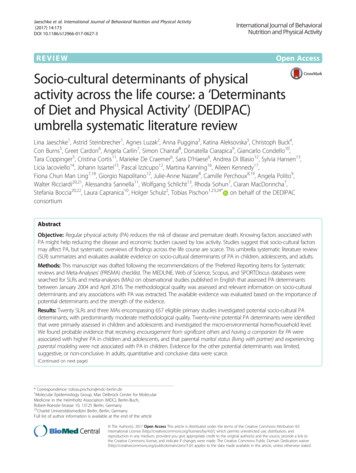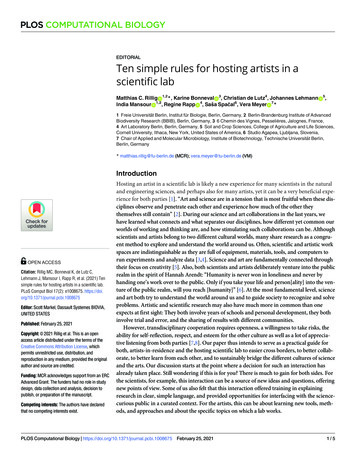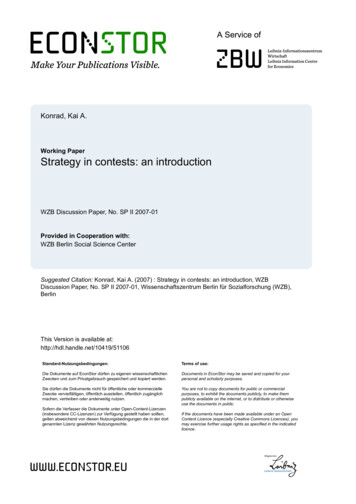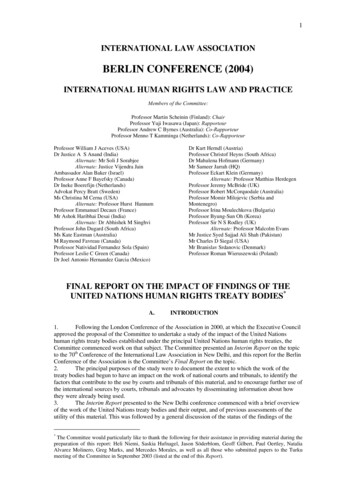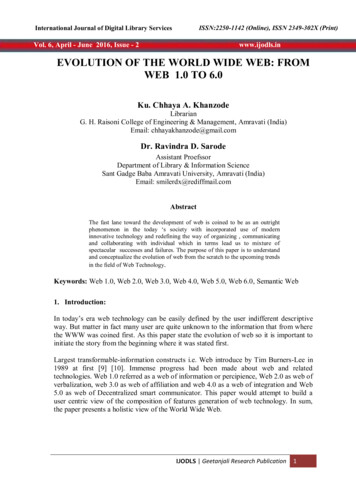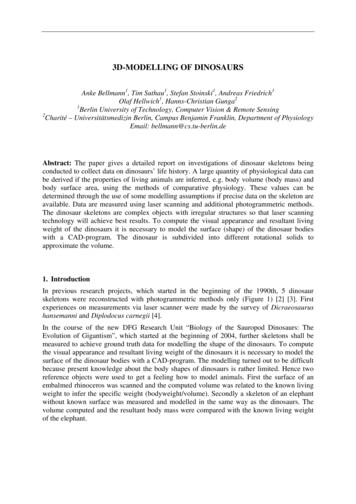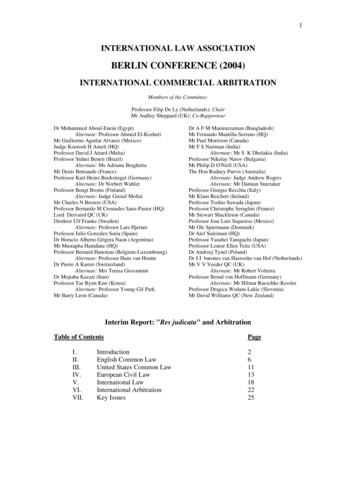
Transcription
1INTERNATIONAL LAW ASSOCIATIONBERLIN CONFERENCE (2004)INTERNATIONAL COMMERCIAL ARBITRATIONMembers of the Committee:Professor Filip De Ly (Netherlands): ChairMr Audley Sheppard (UK): Co-RapporteurDr Mohammed Aboul-Enein (Egypt)Alternate: Professor Ahmed El-KosheriMr Guillermo Aguilar Alvarez (Mexico)Judge Koorosh H Ameli (HQ)Professor David J Attard (Malta)Professor Sidnei Beneti (Brazil)Alternate: Ms Adriana BraghettaMr Denis Bensaude (France)Professor Karl-Heinz Bockstiegel (Germany)Alternate: Dr Norbert WuhlerProfessor Bengt Broms (Finland)Alternate: Judge Gustaf MollerMr Charles N Brower (USA)Professor Bernardo M Cremades Sanz-Pastor (HQ)Lord Dervaird QC (UK)Direktor Ulf Franke (Sweden)Alternate: Professor Lars HjernerProfessor Julio Gonzalez Soria (Spain)Dr Horacio Alberto Grigera Naon (Argentina)Mr Mustapha Hamdane (HQ)Professor Bernard Hanotiau (Belgium-Luxembourg)Alternate: Professor Hans van HoutteDr Pierre A Karrer (Switzerland)Alternate: Mrs Teresa GiovanniniDr Mojtaba Kazazi (Iran)Professor Tae Ryun Kim (Korea)Alternate: Professor Young-Gil ParkMr Barry Leon (Canada)Dr A F M Maniruzzaman (Bangladesh)Mr Fernando Mantilla-Serrano (HQ)Mr Paul Morrison (Canada)Mr F S Nariman (India)Alternate: Mr S K Dholakia (India)Professor Nikolay Natov (Bulgaria)Mr Philip D O'Neill (USA)The Hon Rodney Purvis (Australia)Alternate: Judge Andrew RogersAlternate: Mr Damian SturzakerProfessor Giorgio Recchia (Italy)Mr Klaus Reichert (Ireland)Professor Toshio Sawada (Japan)Professor Christophe Seraglini (France)Mr Stewart Shackleton (Canada)Professor Jose Luis Siqueiros (Mexico)Mr Ole Spiermann (Denmark)Dr Atef Suleiman (HQ)Professor Yasuhei Taniguchi (Japan)Professor Louise Ellen Teitz (USA)Dr Andrzej Tynel (Poland)Dr J J barones van Haersolte-van Hof (Netherlands)Mr V V Veeder QC (UK)Alternate: Mr Robert VolterraProfessor Bernd von Hoffmann (Germany)Alternate: Mr Hilmar Raeschke-KesslerProfessor Dragica Wedam-Lukic (Slovenia)Mr David Williams QC (New Zealand)Interim Report: "Res judicata" and ArbitrationTable of ContentsI.II.III.IV.V.VI.VII.IntroductionEnglish Common LawUnited States Common LawEuropean Civil LawInternational LawInternational ArbitrationKey IssuesPage261113182225
2I. INTRODUCTIONThe Committee was mandated to study and report on lis pendens and res judicata in arbitration. Thisreport is the Committee's first under that mandate, and it is an interim report on res judicata.1This project was commenced under the Chairmanship of Professor Pierre Mayer in 2002, and it hasbeen continued under the Chairmanship of Professor Filip De Ly. The application of res judicata, andvarious drafts of this report, have been discussed at meetings of the Committee in Paris (January 2002),New Delhi (April 2002), Paris (May 2003), San Francisco (September 2003), London (December2003) and Paris (March 2004).2After a conceptual introduction, this report will attempt to give an overview of res judicata from theperspective of comparative domestic law and public international law. Thereafter, the doctrine of resjudicata will be discussed and analysed from an international commercial arbitration focus. Theapplication of res judicata in international arbitration gives rise to a number of complex and apparentlyunresolved issues, which are identified in Part VII and which need further analysis and discussion. TheCommittee's conclusions will be included in a subsequent final report.A.The doctrine of res judicataThe term res judicata refers to the general doctrine that an earlier and final adjudication by a court orarbitration tribunal is conclusive in subsequent proceedings involving the same subject matter or relief,the same legal grounds and the same parties (the so-called "triple-identity" criteria). Althoughterminology may differ as between jurisdictions, this report will use the expression res judicata in awide sense, subject to further definitional clarification in the Committee's final report.The res judicata doctrine has existed for many centuries and in different legal cultures. It was amongstthe principles of the Roman jurists,3 and it was also recognised in ancient Hindu texts.4 It is said to be aclear example of a general principle of law recognised by civilised nations.5Res judicata is said to have: a positive effect (namely, that a judgment or award is final and bindingbetween the parties and should be implemented, subject to any available appeal or challenge); and, anegative effect (namely, that the subject matter of the judgment or award cannot be re-litigated asecond time, also referred to as ne bis in idem). The positive effect is largely uncontroversial. Thisreport is concerned primarily with the negative effect of res judicata.The rationale for the res judicata doctrine finds expression in two Latin maxims:1It was originally intended that the Committee's report for the 2004 ILA Conference would address the doctrinesof both lis pendens and res judicata. In September 2003, it was decided to split the project into separate reportson res judicata and on lis pendens. A final report on res judicata and an interim/final report on lis pendens willbe prepared for the 2006 Toronto Conference.2In addition, the following Committee members have contributed written memoranda: Damien Sturzager, assistedby Ben Tannous (Australia); Bernard Hanotiau (Belgium); Hans van Houtte (Belgium); Fernando MantillaSerrano (HQ/Colombia); Ole Spiermann (Denmark); Hilmar Raeschke-Kessler (Germany); M.I.M. Aboul-Enein,assisted by Dr M. Alameldin (Egypt); S.K. Dholakia (India); Klaus Reichert (Ireland); Jacomijn van Haersoltevan Hof (The Netherlands); José Luis Siqueiros (Mexicio); David Williams QC (New Zealand); Dragica WedamLukic (Slovenia); Bernardo Cremades (Spain); Teresa Giovannini (Switzerland); Johnny Veeder QC (UK); PhilipO'Neill Jr, assisted by Tania Garcia (USA); and the Committee's previous chairman, Pierre Mayer (France). Weare also grateful to Janet Walker (York University) for a contribution on Canada, August Reinisch (University ofVienna) concerning international law, and Nola Donachie and colleagues at Clifford Chance LLP. This reportincorporates some of the information contained in those contributions.3See The Digest, Book 50, ch 17; and Justinian, Institutes, IV 13.5; referred to in Barnett, infra fn 16, at 8.4See Sheoparson Singh v Ramnandan Singh (1916) LR 43 Ind App 91 at 98 (PC), where the principle of resjudicata was recognised in the Hindu text of Katyayana; referred to in Barnett, infra fn 16, at 8.5See e.g. Bin Cheng and other authorities cited, infra fn 105.
3 Interest reipublicae ut sit finis litium (“it is in the public interest that there should be an endof litigation") Nemo debet bis vexari pro una et eadem causa ("no one should be proceeded against twicefor the same cause")The former is a matter of public policy, and the latter is a matter of private justice.There are material differences in the scope and application of res judicata between different legalsystems.The doctrine undoubtedly applies in all principal legal systems to prevent the same claimant bringingthe same claim against the exact same respondent. In mainly Common Law jurisdictions, the doctrinealso applies to prevent the same parties rearguing an issue that has been determined in earlierproceedings between them. The doctrine has been further extended in a limited number of thoseCommon Law jurisdictions to prevent a party raising issues in subsequent proceedings, between thesame parties, that could have been raised in the earlier proceedings but were not raised.When the doctrine is described, it is generally stated that the parties must be the same in the two sets ofproceedings for the doctrine to apply (or, at least, legally deemed to be the same, which the CommonLaw refers to as "privies", e.g. trustee and beneficiary). However, the strictness of this requirementvaries between legal systems. In addition, this requirement has been relaxed somewhat in the UnitedStates, where third parties may rely on the doctrine in some circumstances.Res judicata is generally applied defensively, to stop a claimant bringing the same claim or seekingfurther relief. At least in the United States, it may also be applied offensively to prevent a respondentfrom denying rulings made against it in earlier proceedings.It is generally accepted that the res judicata doctrine applies in the context of international arbitration,such that a final award has res judicata effect (both positive and negative).B.Situations where res judicata might ariseIssues of res judicata might arise in international commercial arbitration in a myriad of differentsituations,6 including between:oa partial award and a final award;otwo arbitral tribunals;oa state court and an arbitral tribunal; andoa supra-national court or tribunal and an arbitral tribunal.Between a partial award and a final award: within arbitral proceedings, an arbitral tribunal may befaced with res judicata problems after rendering a partial final award. Certainly, with increasingbifurcation of arbitral proceedings, arbitral tribunals may struggle with the problem that they are boundby their partial awards where, for instance, during the quantum stage of the proceedings new evidencecomes to light that questions the correctness of certain aspects of the decisions contained in the partialaward.Between two arbitral tribunals: res judicata may arise because the parties institute arbitration based ondifferent agreements to arbitrate arising under the same legal relationship. The battle of forms is atypical example of such a situation.7 A similar situation exists between identical parties in relation to6See e.g. Pierre Mayer, "Litispendance, connexité et chose jugée dans l’arbitrage international", in Liberamicorum Claude Reymond (Litec, Paris, 2004) at 195-203.7See e.g. ICC Case No. 3383 (1979), Collection of ICC Arbitral Awards 1974-1985 (ICC Publishing, Paris, 1990)at 100 and 394, case note by Yves Derains, in which an ICC arbitral clause was substituted for ad hoc arbitration;under the applicable law, the ad hoc arbitrators declined jurisdiction whereupon the claimant instituted ICCarbitration; the sole arbitrator felt bound by the previous ad hoc award deciding that both the ICC and the ad hocagreements to arbitrate had terminated.
4related legal relationships (such as distribution contracts and ensuing sales relationships and otherforms of “group of contracts”). If disputes are brought before different arbitral tribunals, res judicataissues may arise.8Res judicata may also arise if one party argues in subsequent proceedings that a prior award did notexhaust the differences existing between the parties.Another possible scenario is that an amendment to a claim or a counterclaim cannot be institutedbefore the constituted arbitral tribunal for whatever reason (e.g. late filing) and the claimant (or therespondent) is forced to institute parallel arbitration proceedings.Res judicata is also encountered when a claimant brings claims against the same respondent arising outof the same factual situation before different arbitral tribunals. Claimants generally will refrain for costreasons from bringing such parallel arbitrations before different tribunals. However, sometimes suchproceedings are necessary, such as under some insurance policies where claims against the sameinsurance company under different policies are brought before different arbitral tribunals.9Res judicata also arises in multi-party disputes leading to different arbitrations, such as in chain salescontracts.10Between state courts and arbitral tribunals: res judicata questions seem to appear much morefrequently between courts and tribunals than between different arbitral tribunals. Instituting parallelproceedings before state courts may be inspired by legitimate reasons if a party considers that: (i) thereis no agreement to arbitrate; (ii) the arbitration agreement is invalid or unenforceable;11 (iii) thearbitration agreement has expired or otherwise has terminated; (iv) the dispute is not arbitrable; or (v)the dispute does not fall within the scope of the agreement to arbitrate. State courts may also havejurisdiction if the respondent does not raise lack of jurisdiction based on an agreement to arbitrate ordoes raise any such defence too late in the state proceedings. Instituting state court proceedings on themerits in a favourable jurisdiction may be less legitimate if a party files such proceedings in order tofrustrate the arbitration by, amongst other things, obtaining an anti-suit injunction preventing thearbitration from continuing and/or thereby attempting to ensure that any arbitral award will not beenforced in that jurisdiction. In such circumstances, the arbitral tribunal may have to consider the resjudicata effect of the state court's decision on jurisdiction as well as any decision on the merits.Between a supra-national court or tribunal and an arbitral tribunal: increasingly, arbitral tribunals mayhave to have regard to the effects of decisions of supra-national courts or tribunals. The Committee willfurther have to consider whether or not these instances constitute res judicata in relation to relatedarbitral proceedings.In all of these situations save the first (i.e. partial and final awards), even where the parties in thedifferent proceedings are not identical, res judicata issues may arise if it can be said that two of theparties are so closely related that they are privies. A typical example is where two companies in thesame group are parties to the separate proceedings (the group of companies phenomenon), especiallywhere it is a parent company and its controlling shareholder.8See F-X Train, Les contrats liés devant l’arbitre du commerce international (LGDJ, Paris, 2003) at 458-460 and470.9See e.g. Associated Electric & Gas Insurance Services Ltd v European Reinsurance Company of Zurich [2003]UKPC 1129, [2003] 1 WLR 1041, see also infra fn 52.10See e.g. ICC Cases Nos 2745 and 2762 (1977), found in Collection of ICC Arbitral Awards 1974-1985 (ICCPublishing, Paris, 1990) at 326; described infra text page 26. For a more extensive analysis, see BernardHanotiau, "Problems raised by complex arbitrations involving multiple contracts – parties – issues", [2001] J IntArb 356-360; and Bernard Hanotiau, "Quelques réflexions à propos de l’autorité de chose jugée des sentencesarbitrales", in Liber amicorum Lucien Simont (Bruylant, Brussels, 2002) at 301-309.11See e.g. Deutsche Schachtbau- und Tiefbohrgesellschaft v R’As Al Khaimah National Oil Co [1987] 2 Lloyd'sRep 246, where conflicting decisions ensued from a Geneva ICC award and a court decision in R’As AlKhaimah. See also David Scott, "Commentary: practical options when faced with an injunction againstarbitration", (2002) 18 Arbitration International 333-334.
5C.The Committee's objectivesState courts apply the established rules of res judicata applicable in their jurisdiction to determine theeffect of a prior award, but the res judicata doctrine varies between legal systems as briefly indicatedabove. Arbitral tribunals are increasingly faced with issues of res judicata. The approach that arbitraltribunals do, and should, take concerning res judicata is far from consistent and settled.Whilst a global harmonised approach to res judicata by state courts would be admirable, thisCommittee is not seeking to give guidance on how state courts should act in applying their domesticlaws.12 The Committee, instead, in its final report will seek to give guidance to arbitrators, when facedwith a prior judgment or award which is argued to be res judicata. Arbitral tribunals are not necessarilyrequired to apply the same procedural rules as domestic courts and have greater freedom to applyprocedural rules that are appropriate for international arbitration. For international arbitration, wherearbitrations are often conducted under institutional international rules and increasingly uniform laws, aglobal harmonised approach to res judicata would be commendable and the final report will have toelaborate on any such approach.D.Limitations on the scope of the Committee's workThe Committee has considered only the res judicata effect of a prior final (or partial final) award or ofa state court judgment on jurisdiction or on the merits. Other awards or judgments (such asinterlocutory decisions regarding evidence), procedural orders or interim awards that do not containfinal decisions on the merits have been kept outside the scope of the Committee's recent work and ofthis report. The final report may have to address whether awards or judgments other than those coveredin this interim report may qualify for res judicata effect.In addition, parallel proceedings concerning interim measures have not yet been addressed, because,although they are binding on the parties and may have res judicata effect, they do not prejudice upon adecision on the merits. The final report, however, may come back to this issue.In this respect, the question arose within the Committee whether anti-suit injunctions should beaddressed. Anti-suit injunctions clearly are at the heart of any debate as to the relationship betweenstate courts and arbitral tribunals. However, the Committee limited its consideration to the res judicataeffect of a prior decision on jurisdiction by a court/tribunal and did not address the additional impactthat an injunction might have.13Res judicata issues may arise where an award has been set aside at the place of arbitration, but attemptsare made to enforce that award in another jurisdiction. If setting aside has been refused, the losing partymay raise the same issues in seeking to resist enforcement. The enforcement court must have regard tothe grounds prescribed in its law for refusing enforcement (i.e. most probably Article V(2) of the NewYork Convention), but it may be influenced by the earlier decision.14 Even where when an award hasbeen set aside at the place of arbitration, some foreign courts have not considered themselves bound bysuch decision and have enforced that award. The second scenario (i.e. prior annulment) has beenaddressed at length by commentators and has been excluded from the scope of the Committee's presentwork.1512The Committee hopes, nevertheless, that this report will be of interest to state courts that apply an internationallyharmonised arbitration law and to state courts that are open to comparative arguments in developing their laws.Cf. Joint American Law Institute / UNIDROIT Working Group, Principles and Rules of Transnational CivilProcedure (UNIDROIT, Rome, 2004), Article 28 concerning res judicata (available at www.unidroit.org).13On this topic, see e.g. the conference papers presented at the Conference on Anti-Suit Injunctions organised inParis on 21 November 2003 by the Institut d’Arbitrage International (as yet unpublished); and D Scott,"Commentary: practical options when faced with an injunction against arbitration", supra fn 11.14For the weight to be given to the decision of the courts at the place of arbitration which refused to set aside theaward, see e.g. Minmetals Germany GmbH v Ferco Steel Ltd [1999] 1 All ER (Comm) 315, Colman J.15See the well-known cases of Hilmarton, and Chromalloy, discussed in e.g. Lew, Mistelis and Kroll,Comparative International Commercial Arbitration (Kluwer, The Hague, 2003) at paras 26-107 to 26-110, andthe articles cited.
6The time at which judgments and arbitral awards become res judicata may vary from country tocountry. For example, while some legal systems give res judicata effect as of the rendering of thejudgment, others do so only at the end of any appeal process (or the end of the period in which anappeal may be lodged). Likewise, the time at which an award becomes res judicata may be upon itsissue to the parties, but some jurisdictions have different requirements, such as registration. In addition,the commencement of setting aside proceedings may suspend the res judicata status of the arbitralaward. For the purposes of this report, it is assumed that an award, under the applicable law, hasbecome final and binding.Administrative and criminal decisions made by state courts and posing res judicata questions inrelation to international commercial arbitrations are not considered. The effect of such proceedingsmerit separate treatment and would take the Committee's report beyond acceptable limits.II. ENGLISH COMMON LAWA.IntroductionThe doctrine of res judicata is well established in the Common Law jurisdictions of England,16Ireland,17 Canada,18 India,19 Australia20 and New Zealand.21In order for a decision to qualify as a res judicata, it must be pronounced by a judicial tribunal ofcompetent jurisdiction, and the decision itself must be a judicial decision that is final and conclusiveand on the merits.22The effect of a res judicata decision is that it disposes finally and conclusively of the matters incontroversy, such that - other than on appeal - that subject matter cannot be re-litigated between thesame parties (or their privies).23The res judicata effect of an earlier decision is raised by a party in subsequent proceedings bypleading: cause of action estoppel; or issue estoppel. If accepted, the plea will have the effect ofprecluding the other party from contradicting the earlier determination in the later proceedings. Therules of estoppel by res judicata are rules of evidence.24English law recognises two further pleas of preclusion: merger/former recovery; and abuse of process.Although the fourth, abuse of process, has its own rules, some authors have posited that all four16See Halsbury's Laws of England, 4th edn (Reissue), (Butterworths, London, 2003) vol 16(2) under "Estoppel",paras 977-993; Peter Barnett, Res Judicata, Estoppel and Foreign Judgments (Oxford University Press, 2001);Keith Handley, Spencer Bower, Turner & Handley on the Doctrine of Res Judicata, 3rd edn (Butterworths,London, 1996).17See P.A. McDermott, Res Judicata and Double Jeopardy (Butterworths, Dublin, 1999).18See Donald Lange, The Doctrine of Res Judicata in Canada (Butterworths, Markham, Ontario, 2000).19Indian law on res judicata follows English law in essential respects, but it is not identical; see e.g. HopePlantation Ltd v Taluk Land Board (1999) 5 SCC 590 (Sup Ct).20Australian law is also similar but not identical to English law; see e.g. Keith Handley, "Res judicata: generalprinciples and recent developments", (1999) 18 Aust Bar Rev 214, and E Campbell, "Res judicata and decisionsof foreign tribunals", (1994) 16 Sydney Law Rev 311.21Likewise, NZ law is similar but not identical to English law; see e.g. NZ Building Trades Union v NZ FederatedFurniture [1991] 1 ERNZ 331, and Langland v Stevenson [1995] 2 NZLR 474.22See Barnett, supra fn 16, at 11, para 1.18.23See Barnett, supra fn 16, at 8, para 1.11.24Carl-Zeiss Stiftung v Rayner & Keeler Ltd (No 2) [1966] 2 All ER 536 at 564 (HL), per Lord Guest.
7doctrines have as their objective prevention of abuse of the courts' process, and that the term "abuse ofprocess" can be used to describe all four.25Foreign judgments can have res judicata effect similar to domestic judgments.26 However, the foreignjudgment must have res judicata effect at the place it was made; and, the judgment must first berecognised within the forum for it to have any preclusive effect there.27 Any defences to recognitionwould stymie the res judicata effect of the foreign judgment. Peter Barnett notes that the courts observespecial caution when asked to accord preclusive effect to foreign judgments.28Public policy may be a bar to giving res judicata effect to a prior judgment.29B.Cause of action estoppelA "cause of action" comprises all the facts and circumstances necessary to give rise to a right to relief.Generally, all claims arising from a single event and relying on the same evidence will be treated as thesame cause of action.30Cause of action estoppel prevents a party asserting or denying the existence of a particular cause ofaction, the non-existence or existence of which has been determined by a court of competentjurisdiction in previous litigation between the same parties (or their privies).31The cause of action must be identical to that in the earlier proceedings.A plea of cause of action estoppel will often necessitate a review of the reasoning of the earlierjudgment, and not just of the formal order granting or denying relief.C.Issue estoppelIssue estoppel prevents a party in subsequent proceedings from contradicting an issue of fact or lawthat has already been distinctly raised and finally decided in earlier proceedings between the sameparties (or their privies).32The "issue", being an assertion, whether of fact or of the legal consequences of facts, must be anessential element in the cause of action or defence.33As in cause of action estoppel, elements of the reasoning and not just the formal order may give rise tores judicata. Matters of fact or law, which are subsidiary or collateral, are not covered by issueestoppel. A distinction is drawn between the ratio decidendi and what is merely obiter dictum.It has traditionally been accepted that procedural decisions cannot give rise to a plea of issue estoppel.25See e.g. Lord Keith in Arnold v National Westminster Bank plc [1991] 2 AC 93 at 111 (HL).26See Barnett, supra fn 16, starting at 24, para 1.49.27In England, for example, a foreign judgment might be recognised according to the rules of: the Common Law;Administration of Justice Act 1920; Foreign Judgments (Reciprocal Enforcement) Act 1933; or the Brussels orLugano Conventions or the European Council Regulation No 44/2001.28See Barnett, supra fn 16, at 26, para 1.54.29See e.g. Indian Supreme Court decision in Isabella v Susai (1991) 1 SCC 494, where it was held that a priordecision cannot sanction that which is illegal.30Even if different contractual provisions are alleged to have been breached, it will constitute a single cause ofaction.31See Barnett, supra fn 16, at 87-97.32See Barnett, supra fn 16, at 134-182.33See Mills v Cooper [1967] 2 QB 49 at 468-469, per Diplock LJ; approved by the House of Lords in Arnold vNational Westminster plc [1991] 2 AC 93. This requirement exists in the other Commonwealth jurisdictions, withslight variations in wording (e.g. India - "matters directly and substantially in issue" - see Amalgamated CoalFields Ltd v Janapada Sabha AIR 1964 SC 1013).
8The plea of issue estoppel may not be accepted if the party against whom it is pleaded can show thatfurther material, which is relevant to the correctness or incorrectness of the assertion, which could notby reasonable diligence have been adduced by that party in the previous proceedings, has since becomeavailable to it.D.Former recoveryThe doctrine of former recovery precludes a party in whose favour relief has been granted fromreasserting the same claim in order to obtain further relief, based on the same cause of action. It is saidthat the cause of action has been extinguished by the earlier judgment, by merging into that judgment.Once a judgment has been paid or otherwise honoured, the paying party can rely on the equitableprinciple of double satisfaction to prevent further enforcement proceedings.E.Abuse of processCause of action estoppel and issue estoppel concern a cause of action or issue that has been consideredby a court and finally determined. The courts have further extended the doctrine to preclude a party insubsequent litigation from raising subject matter (a claim or an issue) which the party, by the exerciseof due diligence, could and should have brought before the court in the earlier proceedings. This isreferred to as the "rule in Henderson v Henderson".34After the decision of the House of Lords in Johnson v Gore Wood & Co,35 this doctrine is consideredas a category of the "abuse of process" doctrine, rather than an extension of the principles of estoppel.In its most general sense, the doctrine of abuse of process prescribes that subsequent proceedingsshould be precluded if it is necessary for a court to prevent a misuse of its procedure in the face ofunfairness to another party, or to avoid the risk that the administration of justice might be brought intodisrepute among right-thinking people.36 The doctrine rests upon the inherent power of the court toprevent a misuse of its procedures even though a party's conduct may not be inconsistent with theliteral application of the procedural rules (e.g. if the subsequent proceedings were thought to beunjustifiably vexatious and oppressive). 37 Its application is wholly discretionary.F.Same partiesThe preclusive effect of a judgment in personam in subsequent proceedings in English Common Lawjurisdictions is limited according to the rules of privity and mutuality.38The rule of privity prescribes that the only persons that are bound by a judgment, and hence can takeadvantage of its preclusive effects, are the parties to the proceedings from which the judgment derived,or their "privies". No third persons can take advantage of it or be bound by it.The rule of mutuality requires that the estoppel must be mutual, which means that each party (or theirprivies) to the subsequent proceedings must have been a party to the earlier proceedings, and must34(1844) 6 QB 288. In Australia, the abuse of process doctrine is referred to as "Anshun estoppel" after the casethat affirmed the Henderson rule. In Canada, the Supreme Court has recently applied the doctrine of abuse ofprocess to bar a collateral challenge of an earlier decision where the facts did not permit application of thedoctrine of issue estoppel (because there was no mutuality): Toronto (City) v Canadian Union of PublicEmployees [2003] SCJ No 64 (Sup Ct).35[2000] 2 AC 1. See also Baker v McCall International Ltd [2000] CLC 189 per Toulson J; and Desert Sun LoanCorp v Hill [1996] 2 All ER 847 per Evans LJ and Stuart-Smith LJ; but contrast Barnett, supra fn 16, at
1 It was originally intended that the Committee's report for the 2004 ILA Conference would address the doctrines of both lis pendens and res judicata. In September 2003, it was decided to split the project into separate reports on res judicata and on lis pendens. A final report on res judicata and an interim/final report on lis pendens will
